Train strikes in Italy
I was about to leave Italy, by train, when I was surprised by a country-wide railroad strike . Luckily I was near the France border and made it out on next day’s only train. That train happened to pass through a short stretch of French mountain villages and allowed me to continue the trip in France.
My European train trip prevented me from posting last month. And this strike made it clear to me why the common currency, the Euro, can not work.
This strike clearly showed to me what is wrong in Europe. Italians (Greeks,Spaniards, Portuguese) strike to prevent austerity even in the face of imminent bankruptcy. Germans (Austrians, Durch) traditionally accept austerity measures and voluntary restraint, just for stability’s and employment’s sake. German labor unions accept wage cuts, increased retirement age, while their southern counterparts fight teeth and nails for every possible advantage. It has always been this way.
The Italians don’t understand the Germans, and vice versa. In the Euro debt crisis, century-old incompatible cultures clash. Italy defines itself as connection to a person. Not the structure is relevant, but a personal relationship. The Italians know how to take advantage of the Germans (Anton Börner)
Europe’s amazing diversity of cultures and life styles is being threatened
Europe’s amazing diversity of cultures and life styles is being threatened by the Euro. Countries have vastly differing attitudes in hard working vs. relaxed life, ,workers unions’ strikes vs. self worker’s self restraint, sacrifice for the common good vs. self-interest.
Southern European countries’ inflationary tendencies, relaxed attitude towards work, punctuality, price stability were corrected by frequent devaluation of their currency. High interest rates (in their native currency) restrained tendencies to happy-go-lucky overspending.
Germany on the other hand has a hard working,population, willing to forego pay raises,and a very disciplined central bank. Historically, the German Mark regularly appreciated in value. Like the Swiss Franc, which is still appreciating against Euro and Dollar.
This has always been like this, and will not change drastically.
The Euro is an example of human stupidity. Politically correct thinking can not fathom that cultures have totally different life styles and attitudes which can not be tied to one single currency. Argentinia failed catastrophically afther they tied their currency to the dollar.
Germans need to spend more then the Italians and Spanish,. Greeks need to sacrifice and work more then the Germans.
Unless the Germans spend more then the Italians and Spanish, unless the Greeks work harder and sacrifice more then the Germans, the Euro is doomed to fail. Even equal attitudes will not do, because there is 13 years of differing development to be undone and compensated for. . And if the Germans learn to spend like the Italians, the Italians will find ways to spend even more then that.
Note that nobody warned of the impeding doom in the beginning, when the imbalances were already visible and future trouble was clearly foreseeable. Trade imbalances keep adding up. Compare current account balance (CAB) of all nations.
Remember again: the common currency unnaturally binds together unequal nations and prevents market forces from applying corrections through exchange rates. Rather, imbalances compound and worsen year after year.
If the Germans don’t become more Greek then the Greek, and the Greek don’t become more German then the Germans, the Euro will never work.
Germany needs more spending and higher wages
Becoming equal is not enough, because the countries need to catch up 13 years of divergent development. Here a non-orthodox proposal that inverts countries’ practices:: For 10 years, Germany must have high inflation and high wage increases, and Greece low wage increases and low inflation. We think that this is not likely to happen.
Prof. Flassbeck thinks that not only should Greece spend less and decrease wages. Germans should spend more and German Labor Unions should be encouraged to force major pay increases. German products must be paid with Italian and Greek products, not with vapor money. Germany must not out-compete Greece and Italy to the point of destroying their production.
The Southern Nations need
- Growth
- Low Interest
- More exports then imports
If these nations don’t produce and export, they can never pay their debts.
Differing inflation in Northern and Southern Germany
Southern European inflation was always higher.
Southern spending happiness was kept in check through high interest rates and long term effects on competitiveness were avoided through constant devaluation of Southern currencies and revaluation of Northern currencies.
Southern currency devaluations, Northern European revaluations
Regular devaluations of their currencies vs. German revaluation neutralized these cultural effects.
The Euro suddenly stopped devaluation, provided supposedly equal inflation, and equal interest. Unprecedentedly cheap money tempting Southern Europe.
Equal interest, equal inflation forced upon unequal countries with unequal culture.
At the advent of the Euro, Southerner spent like like there was no tomorrow. suddenly there was an influx of cheap money. Their interest rates dropped to extreme lows never seen before. Their wages increased, production cost increased, bubbles were created. Common inflation rate was stipulated go be 2%. German model pupils maintained 0.8% inflation, France the correct 2%, Southern Europe much more. A trend that moves countries cost and competitiveness further and further apart, year by year
The trend was clear from year one. These effects accumulated over 13 years and now are catastrophical.
Same currency but diverging inflation rates in Northern and Southern Europe.
This leads to ever increasing price differences over the years.
An item that cost 100 in 1998, now costs 133 in Southern Europe, 122 in France, and 110 in Germany.
This caused distortions in competitiveness, consumer spending, credit. And caused huge trade imbalances between the European countries. Unit labor costs diverge more and more, making the Southern countries unable to compete.
The graph below shows reasonable equilibrium of Southern Europe until the start of the European Monetary Union and an ever widening imbalance thereafter.
Trade balances became more unbalanced after the Euro
China accumulates US dollars, Germany accumulates target 2 claims against weak Southern European nations
While China raked in Billions of dollars in currency reserves, Germany got € 800 billion target 2 claims, mainly against the potential default countries in the South. This huge credit and other loans and guarantees would make defaults extremely expensive for Germany.
It looks dumb when China collects money the US prints. It is much dumber for Germany to collect debt against potential default nations like Greece, Spain, and Italy.
Compare these loans and guarantees with the German federal Government budget of 312,7 Billion Euro in 2012 out of a GDP of 2.498,8 Billion. Euro. Germany is guaranteeing many years of its federal budget, on top of regular transfer payments. "In 2009, Germany transferred €6.4 billion ($9.22 billion) more to Brussels than it received from it." S1 It is estimated that German yearly transfers of 25 to 74 Billion or more per year would be needed to solve the Southern countries’ problem. S1
The Euro harms German and Greek/Italian/Spanish/Portuguese population alike
While it is self-evident that recessive austerity packages are stifling and unpleasant, there is the constant fable that Germans profited from the Euro. In reality, Germans have reduced consumption, and pay in an undervalued currency for their imports. Worse then China who buys paper dollars printed by the US federal reserve, Germany accumulate debt, guarantees, papers from the weakest Euro countries in the South.
German worker’s income and consumer spending remained flat.
German Exporters and Industrialists increased their profits.The average German worker’s income did not increase.
German consumption barely increased, all production goes to consumers in other countries, and the pay goes to credits to those countries (which might need to be written off). German’s get paid in an undervalued currency and thus have less to spend.
Germans don’t spend themselves. Their products get enjoyed by Southern Europeans
Restraint to compete with China
German Unions are reasonable, keep restraint and backed decades of austerity measures to guarantee employment and competitiveness. Italians don’t have such discipline, they have other priorities.
One reason for German restraint is the competition with China. China keeps salaries and exchange rates artificially low.
The Italian train strike was in protest to austerity measures to avoid Italy’s imminent bankruptcy. Italians are not willing to commit sacrifices to save the Euro, to save their economy. Sacrifice now for a better future. Italians, All of Southern Europe has such attitudes, be it Greeks, Spaniards and Portuguese. While Germans and their labor Unions showed decades of restraint, the Southern Countries don’t share such attitudes.
Euro causes hostility and resentment
Germans rightfully resent having to first support and later bail out other countries with their hard earned money and credit-worthiness. Greece and Italy rightfully resent being forced, by foreigners,, to adopt stringent austerity measures that cause suffering, joblessness, and recession. Instead of uniting Europe, the Euro is fueling anger and resentment.
Sources for this post:
Illustrations, Graphics taken from this German speech "Europa im Abgrund" Die Eurokrise – Prof. Dr. H. Flassbeck 07.03.2012
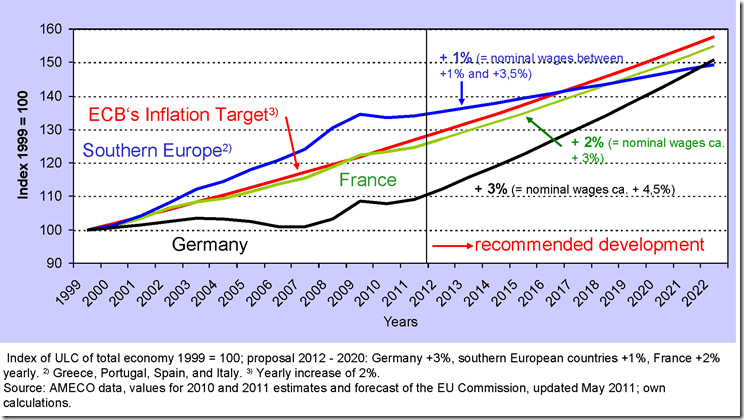
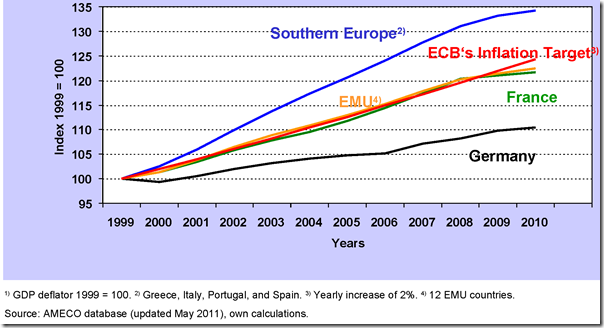
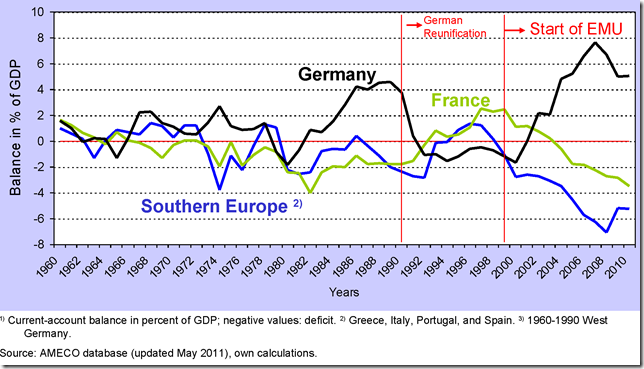
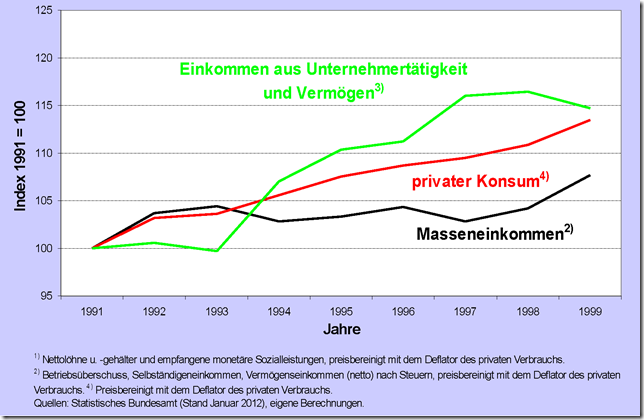
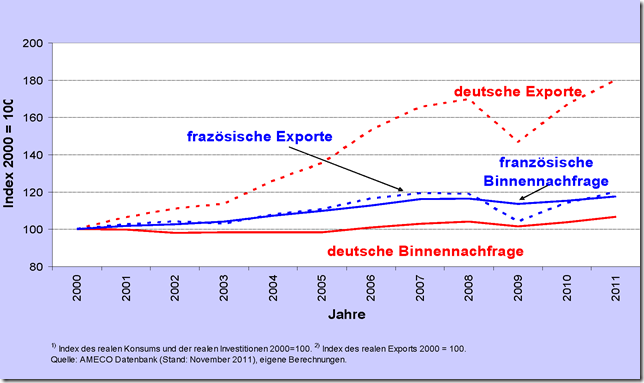
Seeing that the Palestine people were nodmas until the Arab countries around this area told them to settle in Israel so they could have their own country, when they destroyed all Jewish people, and then told to flee when Israel became a nation again. They wanted them to look like the ones who were there first and not the Jewish people. These Jewish people had bought the land from the Ottoman Empire starting in the 1850 s or so and improved the land. Then when the British were in control they continued to buy back the land from all those who lived there.Oh also there never was a country called Palestine until 1967 when Yassar Arafat declared it to be at the Khartoum Conference.This history comes from the Egyptian circa 2500 b.c. then the Assyrian, Babylon, Greek, and the Romans. However there is recorded history of the Jewish people in this area from 1000 b.c.Sorry but the PLO,Hamas, and the Hezbollah are the ones who have made this area a war zone and not the Jewish people.
P.S. Ask ANY Southern European, including French, that has lived and worked in Northern Europe: They’ll ALL tell you the same thing. That while Northern Europe is boring on evenings/weekends, it’s FAR BETTER for working. Better job prospects, better benefits, better hours, better pay, less B.S. at work. Obviously working in Southern Europe is NOT a party, and Southern Europeans would love Northern-style working conditions.
I’m not in the mood to wrote a long-winded post. So, I’m just going to get to the point:
One of the major underlying points in your post -that “Greeks need to work like Germans”- is absolutely false. Greeks [and Spaniards] actually work much more than Germans do; Greeks/Spaniards work more hours per week than Germans do, and get much shorter vacations.
You can look up the statistics right here, courtesy of the OECD: http://stats.oecd.org/Index.aspx?DatasetCode=ANHRS
The average Greek worker worked 2,032 annual hours in 2011 compared to 1,413 for the average German. If you divide these numbers into neat 40-hour weeks (just for the sake of conceptualizing these figures), Greek workers come out working 50 weeks per year, whereas German workers work 35 weeks per year. These figures are for 2011, after “austerity measures” had been passed in Germany.
It’s not that Southern Europeans “are fighting tooth and nail” to keep lavish benefits that Northern Europeans no longer have. Although that’s a common misconception, it’s patently false. Southern Europeans NEVER HAD the benefits that Northern Europeans had, and they don’t even have the REDUCED benefits that Northern Europeans now have, after “austerity measures” were passed in Northern Europe.
Do you now understand why Southern Europeans are always angry and on strike? Southern Europeans DO NOT HAVE THE BENEFITS that Northern Europeans have or EVER had. They work more and get paid LESS, they’ve ALWAYS gotten paid less, and now they’re getting paid even LESS, in order “to be like Northern Europe”…average wages are much lower in Southern Europe than in Northern Europe (these are OECD statstics organized in this Wiki article here: http://en.wikipedia.org/wiki/List_of_countries_by_average_wage look at the far-right column “Gross $ 2011” …Southern Europeans make less, and therefore can’t be taxed at the German rate).
So your assertion that “Greeks need to work like Germans” is not only borderline racist, it’s also patently false. When you hear stories about Greek workers being “lax” and “showing up to work late” and getting insane pay-raises, those stories are derived from the public sector, where it was impossible (before the crisis) to fire workers, who therefore took advantage. Nothing “cultural” here, just universal common sense. Greece’s private sector, on the other hand, is a whole other story: people work insane hours, and often times two jobs for shit pay. Trust me, people in Greece would LOVE the austerity measures that the GERMANS went through. the GREEK austerity measures are far harsher, and it’s not only affecting workers; it’s also affecting poor pensioners, who you completely fail to mention. Pensioners who’ve worked and paid into the system their entire lives, are now having their pensions cut to ridiculously low levels.
There are also other reasons that have contributed to the country’s financial crisis: such as economic reforms that were long overdue. These reforms have NOTHING to do with culture. One example: There are several professions that are protected from competition, and thus it’s impossible to start a career as a lawyer or pharmacist or taxi-cab driver…insane archaic laws that kept the unemployment artificially high, 10% even during the boom years. Another example: there was an old 100-year law that allowed single women to collect their dead parents’ pensions. This was an archaic law stemming from the day when women didn’t typically work outside the home or family business. By the 1980s, the culture had changed, but no one had bothered to change the law. Some women were living with their partners, and even having kids, but were not getting legally married, so that they can collect their parents’ pensions one day. There was so much CRAP that needed reform.
European cultures don’t differ THAT much from each other…this “incredible diversity” that you talk about isn’t there; Europeans have much more in common with each other than with almost anyone outside of Europe. Otherwise, you give us some great economic analysis about the need for Southern Europe to be more competitive (which is true), and on public spending. Of course, you ripped off this analysis from professional economists who’ve been saying these things for years, but at least it has substance. HOWEVER, everything you say on “cultural differences” and “different work ethics” is entirely hogwash. Talk about human stupidity, stick to topics that you know about. If this blog entry was only about worker competitiveness and public spending, it would have been more plausible.
Historically, Southern Europe always had more inflation, less income, more strikes, more siestas, more leisurely work attitudes. I appreciate your long comment. Maybe you explain the reasons: is it wrong government, inefficient work with little results in spite of long hours, low productivity due to low education or leisurely work attitude.
They tend to be friendlier, long winding, talkative, leisurely. That is my impression, now maybe you have statistics.
It may be just the government and central bank attitude: Northern Europe always had austere stable central bank and government. Southern Europe always had huge inflation, devaluation, huge interest rates. These are facts.
I believe that in the case of Greece they had frequent government defaults